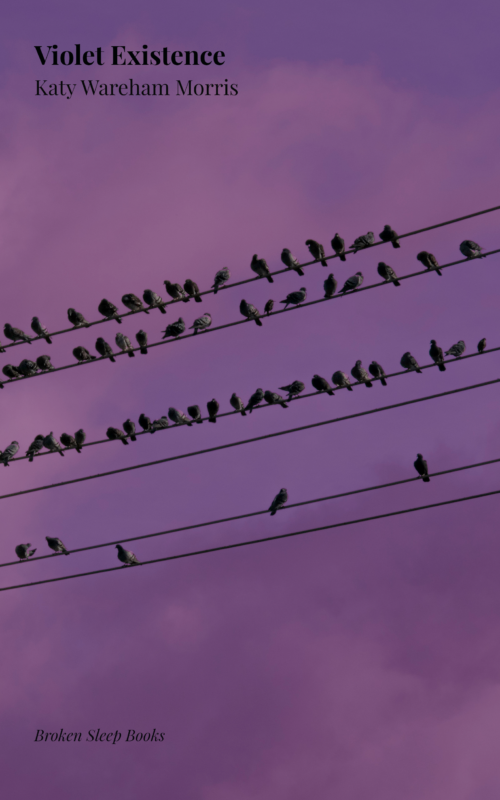REVIEW: KATY WAREHAM MORRIS’ ‘VIOLET EXISTENCE’
Reviewed by Stella Backhouse

“A doing person./Busy, always busy. I don’t [white space] quit”. In late October 2022, as I read those lines from Katy Wareham Morris’s recent pamphlet Violet Existence, it was hard not to recall Liz Truss, whose words in similar vein were drowned out by her actions the very next day. I’m not here to extract sympathy for a woman so alarmingly out of her depth it was obvious she should never have been Prime Minister in the first place. But it did make you wonder, as her brief, disastrous tenure crashed and burned, whether the smoky wisps of Imposter Syndrome ever curled around her mind. If they curled around anyone’s, it probably should have been hers.
No one, of course, wanted to see the country slide even deeper into the mire; but on a personal level, if witnessing the chaotic implosion of Truss’s premiership offered the rest of us the slightly guilty reassurance that at least we’ve never messed up this badly – this publicly – I hope Wareham Morris might have been amongst the comforted. In her acknowledgements, she says of the poems of Violet Existence “they represent the pervasive nature of my Imposter Syndrome: an imposter in my own body, family, work and the world. And of course, in the ‘world of poetry’”.
Wareham Morris has always been unafraid of unconventional form and layout. These poems, with their erasures, ellipses and white spaces between stand-offish columns, graphically reproduce the interior of a mind grappling with perceived failures to fit in. On a work night out, Wareham Morris feels out of place. In the gabbling, brittle pace of the excruciating ‘Curry Night’, she simultaneously over-explains (“I’m still wearin’ me work clothes/which was silly ’cos me top is white an’ I eat whilst I’m talkin’, prone to spillin’”) and under-explains (“I don’t drink ’cos I’ve got Crohn’s (I don’t drink ’cos I overshare))”.
The related poem ‘Trouble in Paradise’ involves a similar scenario, this time contrasting the wandering of the poet’s mind to the TV series Love Island (where a young woman’s life is intentionally made miserable) with her dining companion’s earnest analysis of Greek tragedy. Between them, these poems present an intersectionality of outsider-hood: chronic illness, class (‘Curry Night’ is screaming to be performed in a West Midlands accent), and the female propensity to ‘cheerfully’ self-blame for being unhappy even when she ‘has it all’. Taken together, all of this cycles into a larger unspoken othering: how can someone whose narratives are formed by populist culture, who speaks with a regional accent, have the audacity to write poetry?
The fragility of Wareham Morris’s identity is mirrored by the fragility of the planet, and in particular, by fears about the future of today’s children. However, it’s noticeable that both the poems by other poets that are overtly referenced in Violet Existence (‘Song for Baby-O, Unborn’ by Diane di Prima, and ‘The Horses’ by Edwin Muir) both offer some degree of optimism about the future, even in a post-apocalyptic world.
Although Wareham Morris is at times ambivalent about motherhood (“They were shuck from me./I’m husk./Frozen| abandoned by motherhood”), the ‘Violet Existence’ of the title seems to refer to her children and, by extension, to the future they will have, or perhaps to the poet’s faith in that future. In ‘When summer wouldn’t stop, I remembered’ (the poem that references di Prima), the speaker’s feelings of helplessness are alleviated when “the sand came &/violet candyfloss marshmallows”. This association of the colour violet with children is reprised in the final poem, ‘Summer evening, before’. The poet goes indoors from a dust-laden twilight to find “Then she was there/waving in violet winds/tall/aubergine heather mulberry orchid”. The poem’s concluding line, “They are the World”, suggests that the hope represented by children is Wareham Morris’s abiding emotion.
In Violet Existence, I missed the tight focus of Wareham Morris’s earlier collection Making Tracks; but this invitation to witness her deeply personal responses to the insecurities and uncertainties we all face is nonetheless highly relatable, especially for women. Wareham Morris’s struggles to ‘fit in’ in the workplace and the effects on our mental health are known to many of us, and it helps to know we’re not alone.
Violet Existence is available to purchase online, direct from publisher Broken Sleep Books, as well as other bookshops and retailers.
